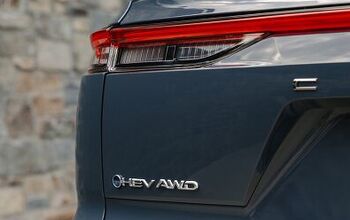So Long, Synergy? Toyota Wants to Break From Its Hybrid Naming Tradition

Despite long, grinding years of adulthood, the word “synergy” still reminds this author of the character on the excruciatingly 1980s cartoon Jem and the Holograms, which his older sister would commandeer the TV set for on various mornings. To Toyota, the word is the centerpiece of Hybrid Synergy Drive — the name applied to its hybrid drivetrains since the dawn of the gas-electric era.
Times change and, just as hoop earrings are no longer rad, the word “hybrid” has evolved to mean any one of a confusingly long list of gas-electric propulsion systems. Studies show that a great many consumers are still mystified about hybrids.
Hybrid Synergy Drive needs a makeover.
Speaking to Automotive News, Ed Laukes, Toyota Motor North America’s marketing boss, claims his company needs to move in a new direction to end the confusion.
“There have been so many variants of hybrids: our version of what we refer to as hybrid technology versus something maybe you saw from General Motors or something you saw from Ford,” Laukes said at the L.A. Auto Show, site of two Toyota hybrid introductions. “Those variants have confused the consumer, ultimately. They don’t even know what hybrid actually even means.”
Thanks to years of bad marketing on the part of OEMs and poor reporting on the part of the news media, too many consumers believe “hybrid” always signifies the presence of a plug, or even the lack of a gas engine altogether. The rise of the word “electrification,” along with the presence of PHEVs, has further muddied the waters. Automakers (some more than others) are keen to brag about their future “electrified” lineups, carefully avoiding mention that this just means one variant of each model in their lineup will boast, at minimum, a hybrid powerplant.
Because of this, Toyota’s signature hybrid name “could go away over time,” Laukes said, without mentioning how exactly Toyota plans to describe the powertrain to the buyer.
“We’re still a long ways away from making that decision of how that’s going to happen,” he said. “But we have to figure out a way to be able to amplify the messaging around all these different powertrains.”
He added, “There could be potentially some name in the future that could represent multiple alternative powertrains.”
Well, this scenario sounds like it could compound the confusing, especially in the absence of a name addition signifying which alternative powertrain lies beneath the hood of the vehicle. While consumers would know that a certain vehicle is green, they wouldn’t know to what extent. If battery electric vehicles are scary due to range concerns, and hydrogen fuel cell vehicles vanishingly rare due to infrastructure limitations, would-be buyers could hear the green word, jump to the wrong conclusion, and immediately state “Oh, that’s the one that’s not for me.”
Of course, Toyotas has well-paid people on staff to predict and avoid this situation, so it’s possible everything will work out tickety-boo.
Sam De La Garza, marketing chief for Toyota’s small car lineup, suggested to AN that hybrids face the same problem that turbocharged vehicles once grappled with. That issue has since been worked out, he claimed. Has it? Some might suggest that Ford’s naming strategy for its line of turbo mills — Ecoboost — could come across as confusing. It sounds like the name you’d give an engine with electric assist, not turbo assist.
Maybe I’m just used to picking on Ford.
[Image: Toyota]

More by Steph Willems
Latest Car Reviews
Read moreLatest Product Reviews
Read moreRecent Comments
- Kwik_Shift_Pro4X Supporting EVs is supporting Chi-nah.
- Eliyahu Oh, a nicer looking 2025 Camry!
- Analoggrotto Sell Canada to Mexico.
- MaintenanceCosts Just here to say thanks for the gorgeous picture of Vancouver, which may be my favorite city in the world.
- TheMrFreeze I don't doubt that trying to manage a company like Stellantis that's made up of so many disparate automakers is a challenge, but Tavares asking for so much money is simply bad form. With the recent UAW strike and the industry still in turmoil, now is not the time. And as somebody with a driveway full of FCA products, I'd just like to say how much I miss Sergio and FCA. At least with him Chrysler and Dodge stood a chance of long term survival...

































Comments
Join the conversation
When it comes to hybrids, everyone knows what a Prius is and that it gets good mileage. That's about it. They don't SEE the myriads of other hybrids on the roads, they have no clue about how they work, and they have even less knowledge about the hybrid/phev distinction. My friends are well educated people. They don't notice that my Escape is a hybrid, and that it doesn't shift. When informed it is a hybrid they are surprised to learn I don't plug it in. While they are concerned about the environment, it does not register that they can use 40% less gas and not change their lifestyles at all. Since I bought the hybrid, not a single person I know who has bought a vehicle has bought a hybrid. While I admit to being somewhat oblivious about hybrids before I first test drove one, at least I had them in mind.
Part of the problem is that full hybrids offer the most advantage in horrible stop and go traffic congestion where the hybrid can creep forward with the gas engine stopped. Nobody wants to think about buying a car specifically for being stuck in traffic congestion. Maybe car manufacturers need to develop more luxury hybrids where the emphasis is on electric motor torque and smooth, quiet power delivery, not highest fuel economy numbers on the EPA test cycle.